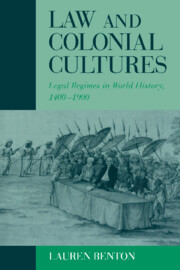Book contents
- Frontmatter
- Contents
- Acknowledgments
- 1 Legal Regimes and Colonial Cultures
- 2 Law in Diaspora: The Legal Regime of the Atlantic World
- 3 Order out of Trouble: Jurisdictional Tensions in Catholic and Islamic Empires
- 4 A Place for the State: Legal Pluralism As a Colonial Project in Bengal and West Africa
- 5 Subjects and Witnesses: Cultural and Legal Hierarchies in the Cape Colony and New South Wales
- 6 Constructing Sovereignty: Extraterritoriality in the Oriental Republic of Uruguay
- 7 Culture and the Rule(s) of Law
- Bibliography
- Index
7 - Culture and the Rule(s) of Law
Published online by Cambridge University Press: 18 December 2009
- Frontmatter
- Contents
- Acknowledgments
- 1 Legal Regimes and Colonial Cultures
- 2 Law in Diaspora: The Legal Regime of the Atlantic World
- 3 Order out of Trouble: Jurisdictional Tensions in Catholic and Islamic Empires
- 4 A Place for the State: Legal Pluralism As a Colonial Project in Bengal and West Africa
- 5 Subjects and Witnesses: Cultural and Legal Hierarchies in the Cape Colony and New South Wales
- 6 Constructing Sovereignty: Extraterritoriality in the Oriental Republic of Uruguay
- 7 Culture and the Rule(s) of Law
- Bibliography
- Index
Summary
This book has argued that the colonial state was in no small part the product of the politics of legal ordering. Early, multicentric legal orders promoted a pattern of jurisdictional complexity whose continuity across regions itself formed an element of international order. Colonial rule magnified jurisdictional tensions and gave greater urgency and symbolic importance to the task of defining the interactions of various legal forums, sources, and personnel. As we saw in the cases of Spanish America, the Ottoman Empire, and British India, territorial colonial expansion prompted a turn to legal pluralism as a colonial project – the formal mapping of interrelations of imposed and indigenous law. This project, aimed at the creation of order, introduced new rules as objects of conflict.
The new hybrid orders struggled especially with the challenge posed by cultural others and intermediaries whose legal roles were difficult to fix and who themselves exploited and attacked ambiguities in the law. The political and symbolic importance of defining the legal status of indigenous subjects stretched across the colonial world. In the cases we examined in the Cape Colony and New South Wales, the legal status of seemingly marginal actors in the legal order became symbolically central to multisided struggles over the structure and scope of new colonial bureaucracies. Throughout the colonial and postcolonial world, as the case study of jurisdictional politics in Uruguay illustrates, the ambiguous status of foreigners in local courts unified external and internal political and legal maneuvering, simultaneously urging a more explicit state claim to territorial sovereignty.
- Type
- Chapter
- Information
- Law and Colonial CulturesLegal Regimes in World History, 1400–1900, pp. 253 - 266Publisher: Cambridge University PressPrint publication year: 2001
- 1
- Cited by



